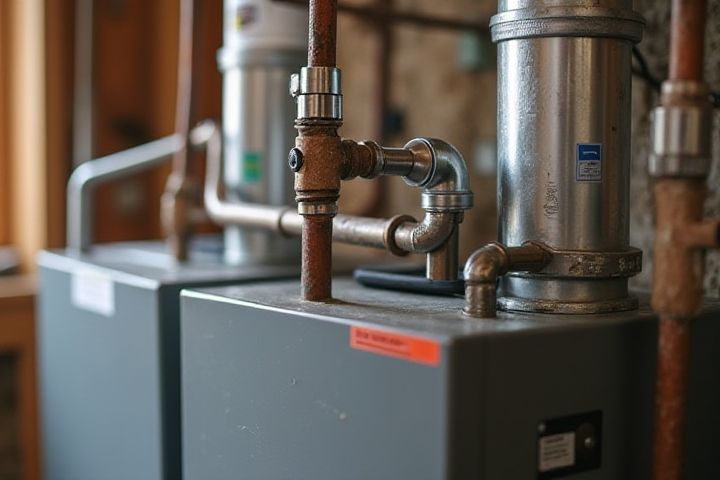
A house's heating system should be considered for an update when it demonstrates decreased efficiency or requires frequent repairs, typically after 15 to 20 years of service. Newer heating technologies, such as high-efficiency furnaces, heat pumps, or smart thermostats, can significantly lower energy bills and enhance comfort. If your monthly utility costs have increased despite regular maintenance, this indicates that your system may not be operating efficiently. Additionally, if you notice inconsistent temperatures throughout your home or excessive noise, it's a signal that an upgrade could improve your indoor environment. Always consult a certified HVAC professional to assess your current system's condition and determine the best options for your needs.
When To Update A House’S Heating System
Age of the system
A heating system typically has a lifespan of 15 to 30 years, depending on the type and maintenance. If your system is nearing or surpassing this age range, it's crucial to consider an upgrade for optimal efficiency and safety. An outdated heating system can lead to increased energy bills, with older units consuming up to 30% more energy than newer models. Regular inspections and efficiency tests can help you determine the right time for replacement, ensuring your home remains comfortable.
Rising energy bills
Rising energy bills can indicate that your heating system is becoming inefficient, often reflected in older systems over 15 years old. According to the U.S. Department of Energy, replacing a furnace or boiler can lead to energy savings of up to 30%. Frequent repairs, especially those exceeding 50% of the cost of a new system, also signal the need for an upgrade. If your heating system requires more than two service calls per year, it may be time to invest in a more efficient model to ensure consistent comfort and reduce ongoing expenses.
Uneven heating
Uneven heating, where some rooms feel too hot while others remain cold, often signals the need for a heating system upgrade. If certain areas in your home maintain a temperature difference of more than 5degF, it may indicate an inefficient system or inadequate insulation. Consider evaluating the age of your heater, as units over 15 years old typically experience performance declines and are less energy-efficient. Updating your heating system can improve overall comfort, enhance energy efficiency by as much as 30%, and reduce monthly utility costs, offering long-term savings and comfort benefits.
Frequent repairs needed
Frequent repairs to your house's heating system, such as needing service multiple times within a year, indicate an underlying issue that may warrant an upgrade. If repair costs begin to exceed 50% of the price of a new heating system, it's often more economical to invest in a replacement. Additionally, systems older than 15 years typically require more frequent maintenance and may not be as energy-efficient, leading to higher utility bills. Evaluating the reliability and performance of your current heating system can help you decide the best time for an upgrade.
Unusual noises or smells
Unusual noises, such as banging, clanking, or squealing, can indicate mechanical issues within your heating system, suggesting it's time for an inspection. A persistent burning smell may point to overheating components or electrical problems, necessitating immediate attention to prevent potential hazards. Unpleasant odors could also stem from dust buildup or mold in the ducts, warranting a thorough cleaning to maintain air quality. By addressing these warning signs promptly, you ensure a safer, more efficient heating system in your home.
New technology options
Updating your house's heating system is essential when your current system exceeds 15 years of age or becomes increasingly inefficient. Modern technologies, such as smart thermostats and high-efficiency boilers, can reduce energy consumption by up to 30%. Consider options like ductless heat pumps, which offer flexible installations and can lower your heating bills significantly. Investing in these advancements enhances comfort and contributes to a more sustainable and energy-efficient home.
Home renovation plans
Updating your home's heating system is crucial when it is over 15 years old, as efficiency typically declines significantly after this point. If you notice your energy bills increasing by more than 30% annually, it may indicate that your system is no longer effective. Implementing a new heating system during renovations can increase your home's value by up to 10%, making it a wise investment. Consider energy-efficient models with a minimum seasonal energy efficiency ratio (SEER) of 15 to enhance comfort and reduce long-term costs.
Environmental considerations
Updating your house's heating system is crucial when evaluating its environmental impact. Older systems may consume over 30% more energy than modern, energy-efficient models, leading to increased greenhouse gas emissions. Transitioning to renewable energy sources, like heat pumps or solar heating, can significantly reduce your carbon footprint by up to 50%. Evaluate your current system's efficiency and consider making an upgrade when its age exceeds 15 years or when maintenance costs rise above 10% of its replacement value.
Tax rebates and incentives
Tax rebates and incentives for updating a heating system can significantly reduce your overall costs, making it an optimal time to consider an upgrade. In 2023, federal tax credits, such as the Energy Efficient Home Improvement Credit, provide up to 30% off your qualifying energy-efficient heating system installation costs. Many state and local governments also offer additional rebates, varying from $500 to $2,000, based on specific energy-efficiency standards met by your new system. By staying informed about these financial benefits, you can maximize your savings while enhancing your home's comfort and efficiency.
Decreased home resale value
A home's heating system significantly influences its resale value, as potential buyers often prioritize energy efficiency and modern amenities. If your heating system is over 15 years old or frequently requires repairs, it's time to consider an upgrade. An outdated heating system can deter buyers, presenting a less appealing offer during negotiations. By replacing your heating system with a modern, energy-efficient option, you not only enhance comfort but also increase the marketability and overall worth of your home.
